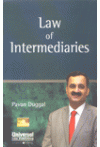- Author(s): Pavan Duggal
- Publisher: Universal LexisNexis
- Edition: 1 Ed 2016
- ISBN 13 9789350356302
- Approx. Pages 551 + Contents
- Delivery Time 3-5 working days (within Kerala & South India) (Others 7-9 days)
............................................................................................................................
Description
We are all living in a networked world. Today, Internet has become an integral part of our day-to-day lives. The advent of the mobile revolution has presented new opportunities for accessing Internet, using comfortable and convenient smart devices. Mobile apps today are the increasingly the flavor of the day. We are all buying and selling things online. We are doing interactions pertaining to banking on the Internet. Our thoughts are being expressed on social media platforms.
In short, we have come to actually align our lives with the Internet, cyberspace and mobile ecosystem. As such, without us realizing, there are large number of other legal entities that are beginning to not just possess but also maintain and process information about ourselves, our transactions, our thought processes, our habits, our choices and our decisions. These players are diverse in their business operations. But yet have one commonality, all these service providers qualify as intermediaries in today's age.
Over a period of time, the legal concept of intermediaries has developed very rapidly. Ever since the advent of the Internet, countries and their respective legislations were only talking about limited concepts like network service providers. As time started passing by, more and more stakeholders increasingly realized that the definition of network service provider was not broad enough to include large number of other service providers who are providing different services on the network. Consequently, the concept of intermediary has gained far more currency.
Today, the concept of intermediary is extremely broad and wide in its scope and ambit as also constantly expanding with each passing day. Different countries and legislative mechanisms are adopting different methodologies and approaches on how to define the concept of intermediaries.
In this context, the legalities pertaining to intermediaries assume significance. Without us realizing, intermediaries, today have become huge data repositories, which are saving valuable data, personally identifiable data as also sensitive personal data and information of their users on their networks and computer resources. As such, intermediaries have been straddled with distinct responsibilities under distinct legal frameworks.
India as a nation has also chosen to regulate the growing number of intermediaries in the Indian cyberspace and mobile ecosystem.
Earlier, the Indian Cyberlaw did not deal with the concept of intermediaries. However, the 2008 amendments to the Indian Information Technology Act, 2000 brought in an extremely wide and broad concept of intermediary. The definition of intermediaries under the Indian Cyberlaw is one of the broadest definitions pertaining to intermediaries on a global scale. The way the Indian Cyberlaw has defined intermediaries, the definition is vast enough to include the majority of companies, corporates and legal entities which are doing business using computers, computer systems, computer networks, computer resources and communication devices as also data and information in the electronic form. The Indian Cyberlaw has prescribed various rights, duties and obligations for intermediaries.
............................................................................................................................
Contents
PART I
Chapter I - General Conditions
Chapter II - Commercial Conditions
Chapter III - Financial Conditions
Chapter IV - Technical Conditions
Chapter V - Operating Conditions
Chapter VI - Security Conditions
Chapter VII - Spectrum Allotment and Use
PART II
Chapter VIII - Access Service
Chapter IX - Internet Service
Chapter X - National Long Distance Service
Chapter XI - International Long Distance Service
Chapter XII - Global Mobile Personal Communication by Satellite Service
Chapter XIII - Public Mobile Radio Trunking Service
Chapter XIV - Commercial VSAT CUG Service
Chapter XV- Insat Mobile Satellite System-Reporting (MSS-R) Service
Chapter XVI - Re-Sale of IPLC Service
............................................................................................................................
Author Details
Pavan Duggal : Advocate, Supreme Court, President of Cyberlaws.
............................................................................................................................

